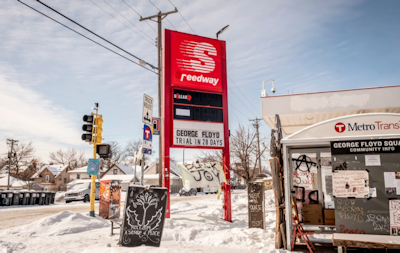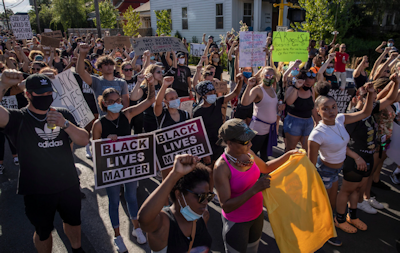The Killing of George Floyd Tore Minneapolis Apart. Now Comes the Trial


In the lead-up to Mr. Chauvin’s trial, which is scheduled to begin with
jury selection on March 8, there is great uncertainty about the case’s outcome
and whether the proceedings could provoke more violence.
&uuid=(email)) Some
office workers in downtown Minneapolis have already been told not to come to
work during the weekslong trial because of heavy security.
The National Guard will be deployed, transforming the city center into a
military zone, with Humvees and armed soldiers monitoring checkpoints. In
his recent budget proposal, Gov. Tim Walz included a special $4.2 million
item for security during the trial, as well as a $35 million fund to reimburse
local law enforcement agencies that may be called upon to quell unrest.
Some
office workers in downtown Minneapolis have already been told not to come to
work during the weekslong trial because of heavy security.
The National Guard will be deployed, transforming the city center into a
military zone, with Humvees and armed soldiers monitoring checkpoints. In
his recent budget proposal, Gov. Tim Walz included a special $4.2 million
item for security during the trial, as well as a $35 million fund to reimburse
local law enforcement agencies that may be called upon to quell unrest.
“This is the most famous police brutality prosecution in the history of the
United States,” said Paul Butler, a former prosecutor who is a professor at
Georgetown University and an authority on police brutality.
The trial may yet be delayed. The prosecution has asked an appeals court to
put off the proceedings, citing the risk that the trial, with so many
demonstrators likely to fill the streets, becomes a superspreader event
during the coronavirus pandemic.
“This appeal involves a question of exceptional and unique importance in
one
of the highest-profile cases in our nation’s history,” reads the first
sentence of the appellate brief filed by Keith Ellison, Minnesota’s attorney
general, who is leading the prosecution.
The state is also appealing a decision by Judge Peter A. Cahill to separate the
trial of Mr. Chauvin, who is charged with second-degree murder and second-degree
manslaughter — the initial charge of third-degree murder was dropped — from the
trial of three other former officers involved in Mr. Floyd’s death, two of whom
were rookies with just a few days on the job.
Mr. Floyd’s death forced a reckoning with racial injustice and police brutality
that many felt was long overdue. Not since the civil rights movement of the
1960s had so many Americans taken to the streets to demand justice and equality.
That it happened in the middle of a pandemic only added to the sense of
magnitude.
Mr. Floyd died on Memorial Day after a store clerk called the police on him for
allegedly using a counterfeit $20 bill to buy cigarettes. Soon, the impact of
his death on the broader world will narrow — to a specially built courtroom,
No. 1856, designed for social distancing at the Hennepin County Government
Center in downtown Minneapolis.
&uuid=(email)) Lawyers
and legal experts often bring up two of America’s most famous trials
involving race and the police when asked to place the criminal cases arising
from Mr. Floyd’s death in a historical context. One is the Rodney King
case in Los Angeles in 1992, for its obvious parallels of white officers
brutalizing a Black man. The other is the O.J. Simpson trial, which offers an
example of how an emotional trial can become a televised spectacle.
Lawyers
and legal experts often bring up two of America’s most famous trials
involving race and the police when asked to place the criminal cases arising
from Mr. Floyd’s death in a historical context. One is the Rodney King
case in Los Angeles in 1992, for its obvious parallels of white officers
brutalizing a Black man. The other is the O.J. Simpson trial, which offers an
example of how an emotional trial can become a televised spectacle.
Judge Cahill, citing the immense interest in the Chauvin case and the
pandemic restrictions that will limit public attendance, has ruled that
cameras will be allowed in the courtroom, a first in Minnesota.
There are also persistent fears that the trial could attract white supremacists
or other right-wing extremist groups to the city. Already, during pretrial
hearings, lawyers for the defendants have been harassed; one man was arrested
after managing to get a gun inside the courthouse.
Earl Gray, Mr. Lane’s lawyer, was in his office on a recent morning, explaining
that Mr. Floyd’s drug use will probably be at the center of the case, when his
phone rang. It was another in a stream of harassing phone calls he has been
receiving for months.
Seating an impartial jury could be the most vexing challenge of the entire
proceeding, and three weeks have been scheduled just for picking a jury.
nytimes.com